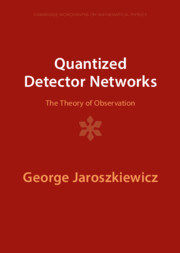
-
Select format
-
- Publisher:
- Cambridge University Press
- Publication date:
- 13 July 2023
- 27 July 2023
- ISBN:
- 9781009401432
- 9781009401456
- 9781009401425
- Creative Commons:
-
This content is Open Access and distributed under the terms of the Creative Commons Attribution licence CC-BY-NC-ND 4.0.
https://creativecommons.org/creativelicenses - Dimensions:
- (244 x 170 mm)
- Weight & Pages:
- 0.847kg, 390 Pages
- Dimensions:
- (244 x 170 mm)
- Weight & Pages:
- 0.68kg, 390 Pages
Open AccessYou have digital access to this book
Book description
Scientists have been debating the meaning of quantum mechanics for more than a century. This book for graduate students and researchers gets to the root of the problem: how the contextual nature of empirical truth and the laws of observation impact on our understanding of quantum physics. Bridging the gap between non-relativistic quantum mechanics and quantum field theory, this novel approach to quantum mechanics extends the standard formalism to cover the observer and their apparatus. The author demystifies some of the aspects of quantum mechanics that have traditionally been regarded as extraordinary, such as wave-particle duality and quantum superposition, emphasizing the scientific principles rather than the mathematical modelling. Including key experiments and worked examples throughout, the author encourages the reader to focus on empirically sound concepts and avoid metaphysical speculation. Originally released in 2017, this title has been reissued as an Open Access publication on Cambridge Core.
Contents
Full book PDF-
Frontmatter
pp i-vi -
-
- You have access
- Open access
- Export citation
-
-
Contents
pp vii-xiv -
-
- You have access
- Open access
- Export citation
-
-
Preface
pp xv-xvii -
-
- You have access
- Open access
- Export citation
-
-
Acronyms
pp xviii-xviii -
-
- You have access
- Open access
- Export citation
-
-
1 - Introduction
pp 1-12 -
-
- You have access
- Open access
- Export citation
-
-
2 - Questions and Answers
pp 13-27 -
-
- You have access
- Open access
- Export citation
-
-
3 - Classical Bits
pp 28-45 -
-
- You have access
- Open access
- Export citation
-
-
4 - Quantum Bits
pp 46-59 -
-
- You have access
- Open access
- Export citation
-
-
5 - Classical and Quantum Registers
pp 60-74 -
-
- You have access
- Open access
- Export citation
-
-
6 - Classical Register Mechanics
pp 75-83 -
-
- You have access
- Open access
- Export citation
-
-
7 - Quantum Register Dynamics
pp 84-104 -
-
- You have access
- Open access
- Export citation
-
-
8 - Partial Observations
pp 105-113 -
-
- You have access
- Open access
- Export citation
-
-
9 - Mixed States and POVMs
pp 114-130 -
-
- You have access
- Open access
- Export citation
-
-
10 - Double-Slit Experiments
pp 131-147 -
-
- You have access
- Open access
- Export citation
-
-
11 - Modules
pp 148-161 -
-
- You have access
- Open access
- Export citation
-
-
12 - Computerization and Computer Algebra
pp 162-171 -
-
- You have access
- Open access
- Export citation
-
-
13 - Interferometers
pp 172-178 -
-
- You have access
- Open access
- Export citation
-
-
14 - Quantum Eraser Experiments
pp 179-197 -
-
- You have access
- Open access
- Export citation
-
-
15 - Particle Decays
pp 198-216 -
-
- You have access
- Open access
- Export citation
-
-
16 - Nonlocality
pp 217-231 -
-
- You have access
- Open access
- Export citation
-
-
17 - Bell Inequalities
pp 232-249 -
-
- You have access
- Open access
- Export citation
-
-
18 - Change and Persistence
pp 250-262 -
-
- You have access
- Open access
- Export citation
-
-
19 - Temporal Correlations
pp 263-270 -
-
- You have access
- Open access
- Export citation
-
-
20 - The Franson Experiment
pp 271-278 -
-
- You have access
- Open access
- Export citation
-
-
21 - Self-intervening Networks
pp 279-290 -
-
- You have access
- Open access
- Export citation
-
-
22 - Separability and Entanglement
pp 291-298 -
-
- You have access
- Open access
- Export citation
-
-
23 - Causal Sets
pp 299-308 -
-
- You have access
- Open access
- Export citation
-
-
24 - Oscillators
pp 309-321 -
-
- You have access
- Open access
- Export citation
-
-
25 - Dynamical Theory of Observation
pp 322-342 -
-
- You have access
- Open access
- Export citation
-
-
26 - Conclusions
pp 343-344 -
-
- You have access
- Open access
- Export citation
-
Metrics
Altmetric attention score
Full text views
Full text views help Loading metrics...
Loading metrics...
* Views captured on Cambridge Core between #date#. This data will be updated every 24 hours.
Usage data cannot currently be displayed.
Accessibility standard: Unknown
Why this information is here
This section outlines the accessibility features of this content - including support for screen readers, full keyboard navigation and high-contrast display options. This may not be relevant for you.
Accessibility Information
Accessibility compliance for the PDF of this book is currently unknown and may be updated in the future.

